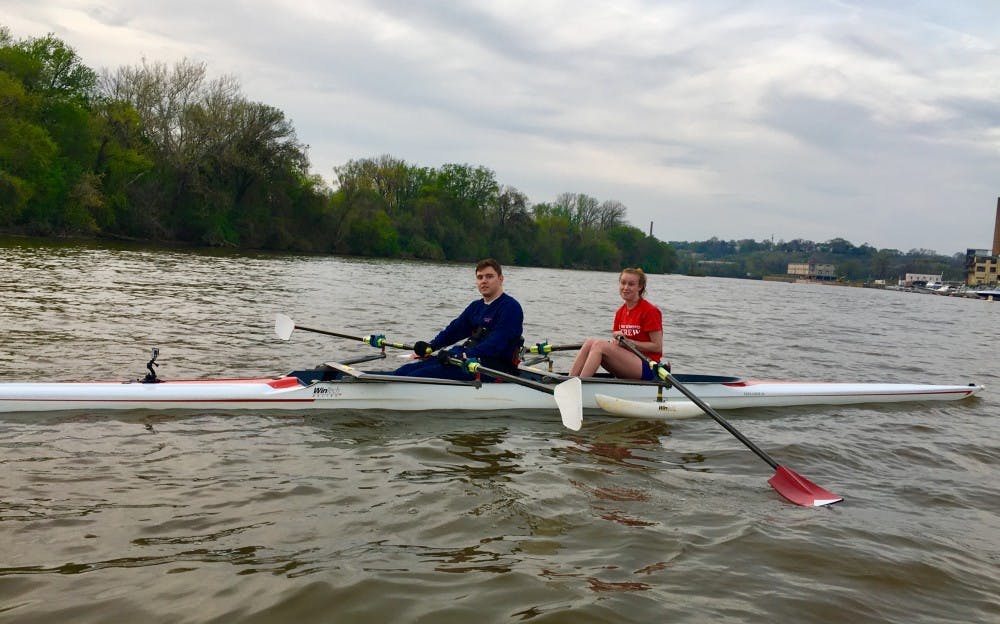It was an exceptionally warm, but windy, April evening. Members of the University of Richmond club crew team were gathered on the docks, looking out over the water as the sun dipped below the city's skyline.
“I haven’t decided yet if I’m going to have Cole do the full 1,000 meters or just 500 for the regatta,” Tim Nesselrodt, assistant coach of the team, said. “We’ll see how today goes."
It was the second-to-last practice he would have with Cole Sydnor, RC ’17, before their first regatta on April 22, where Sydnor will become the first adaptive rower to compete at the collegiate level.
According to the official U.S. rowing website, adaptive rowing refers to the adapted equipment rowers with physical disabilities use.
Sydnor was 16 when he dove into the James River and hit his head on a submerged rock. The accident split his head open and fractured his vertebrae, which caused him to immediately become paralyzed from the chest down.
“I made him understand that he is a mind, a soul and a heart. That was the most important part about moving forward after his accident,” Kelly Sydnor, Cole’s mother, said.
Cole was approached by Nesselrodt about a month ago with this history-making opportunity and was on board from the start.
“People in wheelchairs need to have the same opportunities as anyone else, and I'm passionate about inspiring other people to seek them,” Cole said.
Nesselrodt had been interested in starting a competitive collegiate adaptive rowing program since he was a crew coach at Virginia Commonwealth University (VCU). Nesselrodt, who came to UR's crew team in January, said that he received a lot of pushback when he approached VCU with the idea.
“Everything fell in line at UR because we already had the necessary pieces in place,” Nesselrodt said. “The issues with VCU were mostly logistics, like finding adaptive rowers and working around certain rules — it’s something that has never been done before.”
When Nesselrodt presented the UR crew team with the proposal, everyone was receptive to the idea. The club team practices early every weekday morning, but several of them have also started showing up for Sydnor's Monday evening practices.
“We all want to help out and show our support for Cole,” team member Ryan Fox, RC ’18, said.
Enjoy what you're reading?
Signup for our newsletter
A few members of the club team also have previous experience with the adaptive equipment.
“Because Cole doesn't have the full muscular control to balance a regular boat, the one he practices on is rigged so that there can be someone in the boat with him to help,” Fox said.
According to the U.S. rowing website, adaptive boats are equipped for each rower to use two oars instead of the traditional single oar. This process of using two oars is called sculling.
“I showed up to practice one day and was the only one properly dressed. I knew how to scull, so they put me in the boat with Cole,” Jen Wicks, WC ‘20, said.
Wicks was appointed as Cole’s official partner, and has been practicing with him ever since.
“Cole and I both don’t use our legs when we row, so it’s only arms and body,” Wicks said. “Normally when you row, you push off with your legs, so for us it’s all upper body strength, but luckily Cole is very strong.”
This practice marked Cole’s third time out in the water with Wicks. Nesselrodt said that each day they learn something new.
“[Cole] is great when he’s on the water,” Tyler Anderson, RC '19, president of the crew team, said. “Seeing him out there is so cool — it makes it all worthwhile.”
For those involved with this initiative, the magnitude of what it means for both the future of adaptive rowing and for providing more opportunities to those with disabilities is not lost.
“I think a lot of colleges are scared to dedicate the time and resources and have [an adaptive program] fail,” Nesselrodt said. “But we're super pumped to be the first ones and show people that it's doable.”
“I think about all the possibilities, about all the people that can be helped, encouraged and motivated by seeing somebody else in the same situation take charge of their lives,” Kelly said.
With less than one week until the April 22 regatta, there is lots of excitement from the team.
“It’s going to be cool because there will be colleges from all over the place, and I’ll be on the water just like everyone else,” Cole said. “There will be a separate competition for adaptive rowers, but I don't know if I'll be competing against anyone.”
“If I am the only one though, I’m going to win, I can promise you that,” he said. “And I’m going to set a world record.”
Contact news editor Jocelyn Grzeszczak at jocelyn.grzeszczak@richmond.edu.
Support independent student media
You can make a tax-deductible donation by clicking the button below, which takes you to our secure PayPal account. The page is set up to receive contributions in whatever amount you designate. We look forward to using the money we raise to further our mission of providing honest and accurate information to students, faculty, staff, alumni and others in the general public.
Donate Now



